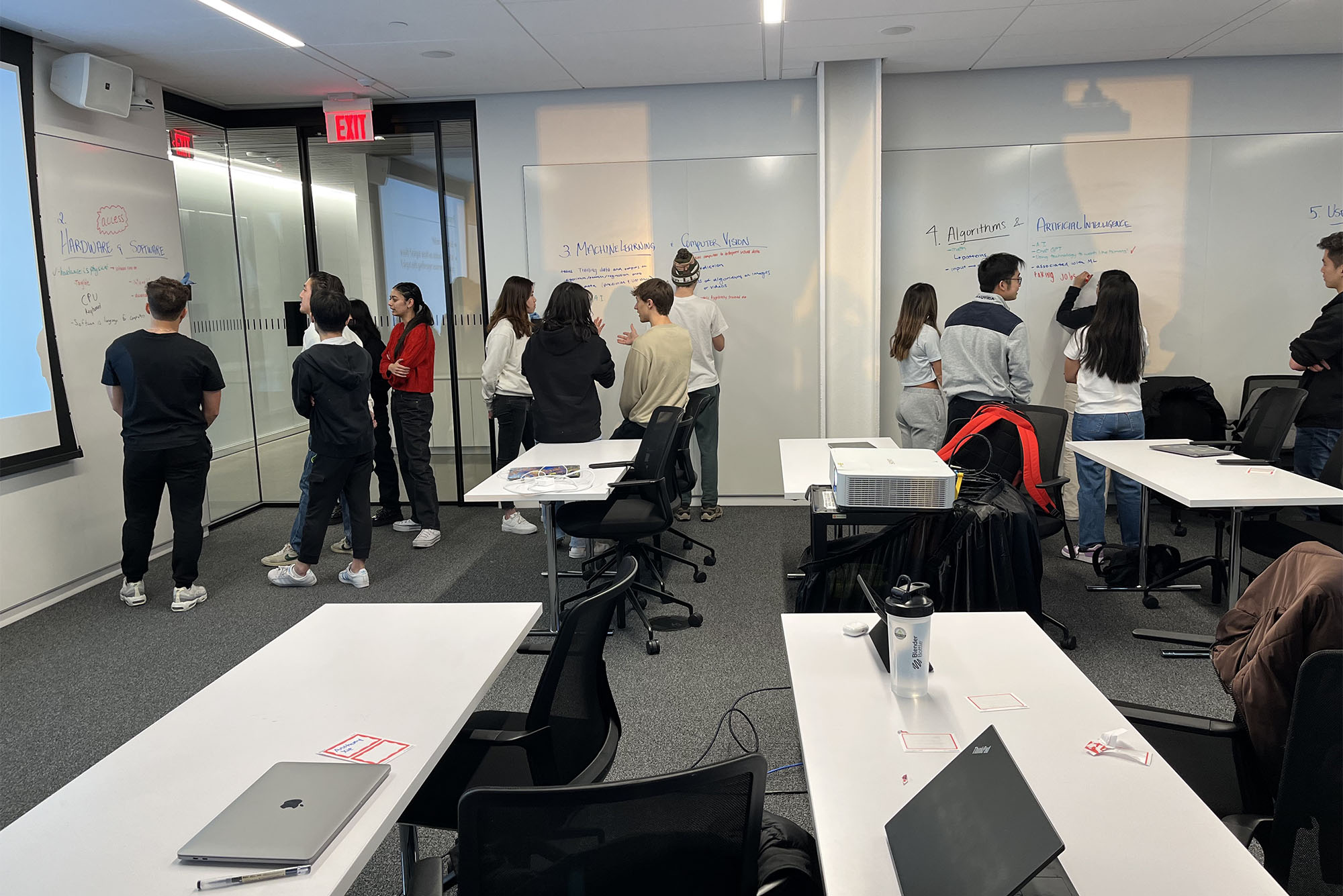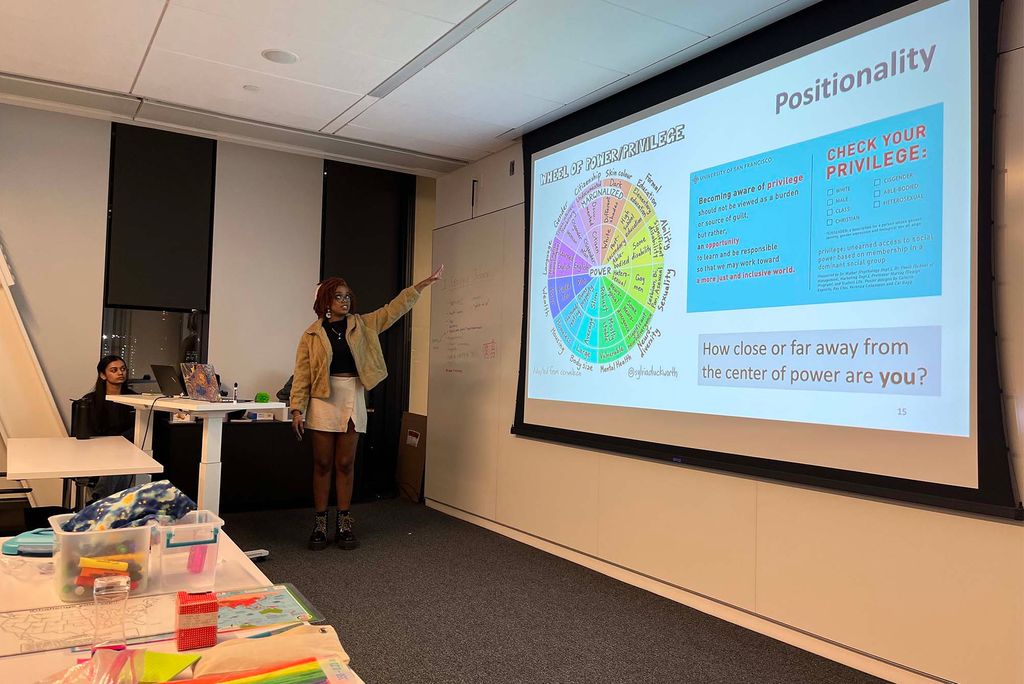This Student-Created CDS Workshop Examines Equality in the Technology Industry

Students gather in small groups to discuss their knowledge of different technology terms during a session of Spark! Exploring DEI in Tech, a CDS workshop designed by Junia Janvier (CAS’23). Photo by Kristen Handricken
This Student-Created CDS Workshop Examines Equality in the Technology Industry
Spark! Exploring DEI in Tech covers topics like bias in AI and the STEM pipeline
Every sector can benefit from investing in diversity and inclusion work.
Algorithmic bias, nonaccessible web design—as a computer science major, Junia Janvier (CAS’23) thought often about the inequities in the field she was studying. Then there were the broader issues within the technology industry as a whole, from a lack of representation at top companies to the Wild West of AI content and copyrights. She realized there were plenty of opportunities to study more inclusive practices in tech.
Initially, Janvier thought she’d just dive into a research project for her job as a diversity and inclusion coordinator at BU Spark! the tech incubator and lab for student-led computational and data-driven projects. But once she started bouncing ideas off Spark! staff, a bigger idea began to take shape.
“We talked about what’s something long-standing we could create that would have a lasting impact” at Boston University, Janvier says. “And that’s how the idea for a class came in.”
Thus Spark! Exploring DEI in Tech was born in 2021, with support from BU Spark! and a grant from BU Diversity & Inclusion (D&I). The two-credit Faculty of Computing & Data Sciences workshop explores topics related to diversity, equity, inclusion, and justice in the technology sector. It fulfills one BU Hub unit.
Most uniquely: it’s partially taught by students.
Kristen Handricken, a CDS adjunct instructor and former director of learning and training for BU D&I, served as the instructor of record (a new instructor is taking over in the fall). Each semester, two or three students work as teaching assistants and learning facilitators and lead segments of the course.
“It’s been interesting to see how the students’ own experiences and insights really fuel [each iteration],” Janvier says. “And just seeing how much the class has grown through word of mouth—we had [to start] wait-lists at one point. Clearly, it’s resonating in some way.”
Janvier designed the curriculum with the help of BU Spark! The goal is to give students a foundational understanding of DEIJ issues in the STEM and computer science fields. The first part of the course digs into issues like bias in hardware, machine learning, and AI algorithms and in inequities in STEM education and employee retention. The second part focuses on action and leadership. Guest speakers have included staffers from Intel, Google, and Snapchat.
For the final project, students select a problem related to BU and technology at large to solve. Their job is to come up with strategies to address the issue and submit an idea chart, an implementation timeline, and stakeholder interviews. They present their proposals at the end of the semester. One past project: a proposal by Olivia Bené (CAS’23) for pass/fail grading for first-year computer science students to increase accessibility and student retention.

“It was so refreshing to talk about technology in the scope of it not being perfect, but rather flawed and needing a great deal of work to make it more inclusive and accessible,” says Bené, calling the workshop one of her favorite classes from her time at BU.
“As a woman in STEM, I have experienced biases right here on campus, in my own computer science courses,” she says. “I felt rather discouraged by them and assumed that’s all that my future would be full of. However, the work in this course and the research I did for my final project illustrated that change in this industry is possible as long as people are willing to put the work in, and it empowered me to be one of those people.”
It’s critical for individuals studying tech to understand the responsibility inherent in creating the systems that the world runs on, Janvier says. “Computer science is in everything we do,” she says. “It’s not a separate industry, necessarily; if you work in medicine and use any medical technology, for example, there’s coding behind that. And there are different motivations behind any programmer who’s making that for you.”
With many programs and algorithms, she says, “we’re starting to see patterns like, ‘Oh, this negatively affects this population disproportionately,’ or, ‘Programmers only had certain people in mind when they were creating this.’” (Cases in point, she says: the discrepancy in Google image results when you search “three Black teenagers” versus “three white teenagers,” or pulse oximeters not reading dark skin as accurately as light skin.)
That’s why this course is so important to her.
“I can’t expect that everyone who takes it will immediately go into these industries and push these big ideas—even if ideally they would!” she says. “To me, the first step is students being mindful of how they program, and what their role and experience is and how that affects others.”
The hope is that Janvier’s success also inspires other students to run with their ideas, says BU Spark! founding director Ziba Cranmer.
“I think there are a lot of students with a lot of great ideas and leadership capacity, and I just want them to feel like they can do this,” Cranmer says, “and that we’re here to support them if they want to keep going.”

Comments & Discussion
Boston University moderates comments to facilitate an informed, substantive, civil conversation. Abusive, profane, self-promotional, misleading, incoherent or off-topic comments will be rejected. Moderators are staffed during regular business hours (EST) and can only accept comments written in English. Statistics or facts must include a citation or a link to the citation.